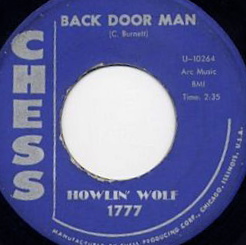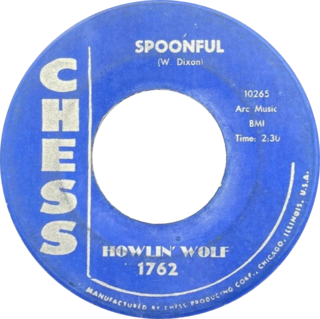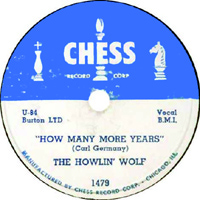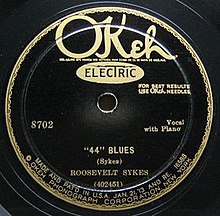
Chester Arthur Burnett, better known by his stage name Howlin' Wolf, was an American blues singer and guitarist. He was at the forefront of transforming acoustic Delta blues into electric Chicago blues, and over a four-decade career, recorded blues, rhythm and blues, rock and roll, and psychedelic rock. He is regarded as one of the most influential blues musicians of all time.

"Back Door Man" is a blues song written by American musician Willie Dixon and recorded by Howlin' Wolf in 1960. The lyrics draw on a Southern U.S. cultural term for an extramarital affair. The song is one of several Dixon-Wolf songs that became popular among rock musicians, including the Doors who recorded it for their 1967 self-titled debut album.

Moanin' in the Moonlight is a compilation album and the first album by American blues artist Howlin' Wolf, released by Chess Records in 1959. It contains songs previously issued as singles, including one of his best-known, "Smokestack Lightning". Rolling Stone ranked it number 477 on its 2020 list of "the 500 Greatest Albums of All Time".

"Goin' Down Slow" or "Going Down Slow" is a blues song composed by American blues singer St. Louis Jimmy Oden. It is considered a blues standard and "one of the most famous blues of all".

"Spoonful" is a blues song written by Willie Dixon and first recorded in 1960 by Howlin' Wolf. Called "a stark and haunting work", it is one of Dixon's best known and most interpreted songs. Etta James and Harvey Fuqua had a pop and R&B record chart hit with their duet cover of "Spoonful" in 1961, and it was popularized in the late 1960s by the British rock group Cream.

"Killing Floor" is a 1964 song by American blues singer-songwriter and guitarist Howlin' Wolf. Called "one of the defining classics of Chicago electric blues", "Killing Floor" became a blues standard with recordings by various artists. It has been acknowledged by the Blues Foundation Hall of Fame, which noted its popularity among rock as well as blues musicians. English rock group Led Zeppelin adapted the song for their "The Lemon Song", for which Howlin' Wolf is named as a co-author.

"Smokestack Lightning" is a blues song recorded by Howlin' Wolf in 1956. It became one of his most popular and influential songs. It is based on earlier blues songs, and numerous artists later interpreted it.

"Rollin' and Tumblin'" is a blues standard first recorded by American singer-guitarist Hambone Willie Newbern in 1929. Called a "great Delta blues classic", it has been interpreted by hundreds of Delta and Chicago blues artists, including well-known recordings by Muddy Waters. Rock musicians usually follow Waters' versions, with the 1960s group Cream's rendition being perhaps the best known.
"Wang Dang Doodle" is a blues song written by Willie Dixon. Music critic Mike Rowe calls it a party song in an urban style with its massive, rolling, exciting beat. It was first recorded by Howlin' Wolf in 1960 and released by Chess Records in 1961. In 1965, Dixon and Leonard Chess persuaded Koko Taylor to record it for Checker Records, a Chess subsidiary. Taylor's rendition quickly became a hit, reaching number thirteen on the Billboard R&B chart and number 58 on the pop chart. "Wang Dang Doodle" became a blues standard and has been recorded by various artists. Taylor's version was added to the United States National Recording Registry in 2023.

"Sitting on Top of the World" is a country blues song written by Walter Vinson and Lonnie Chatmon. They were core members of the Mississippi Sheiks, who first recorded it in 1930. Vinson claimed to have composed the song one morning after playing at a white dance in Greenwood, Mississippi. It became a popular crossover hit, and was inducted into the Grammy Hall of Fame in 2008.

"Little Red Rooster" is a blues standard credited to arranger and songwriter Willie Dixon. The song was first recorded in 1961 by American blues musician Howlin' Wolf in the Chicago blues style. His vocal and slide guitar playing are key elements of the song. It is rooted in the Delta blues tradition and the theme is derived from folklore. Musical antecedents to "Little Red Rooster" appear in earlier songs by blues artists Charlie Patton and Memphis Minnie.

Hoodoo Man Blues is the debut album of blues vocalist and harmonica player Junior Wells, performing with the Junior Wells' Chicago Blues Band, an early collaboration with guitarist Buddy Guy. Released on LP by Delmark Records in November 1965, the album has been subsequently reissued on CD and LP by Delmark and Analogue Productions.

"Evil", sometimes listed as "Evil (Is Going On)", is a Chicago blues song written by Willie Dixon. Howlin' Wolf recorded the song in Chicago for Chess Records in 1954. It was included on the 1959 compilation album Moanin' in the Moonlight. When he re-recorded it for The Howlin' Wolf Album in 1969, "Evil" became Wolf's last charting single, reaching number 43 Billboard R&B chart.
Joseph Leon "Jody" Williams was an American blues guitarist and singer. His singular guitar playing, marked by flamboyant string-bending, imaginative chord voicings and a distinctive tone, was influential in the Chicago blues scene of the 1950s.

The Howlin' Wolf Album is the first studio album by Howlin' Wolf, released in 1969. It features members of Rotary Connection as his backing band. The album mixed blues with psychedelic rock arrangements of several of Wolf's classic songs. Howlin' Wolf strongly disliked the album, which is noted on the album's cover art. The album peaked at number 69 on Billboard magazine's "Black Albums" chart.

"Driving Wheel", also called "Drivin' Wheel" or "Driving Wheel Blues", is blues song first recorded by Roosevelt Sykes in 1936. It was an influential early blues composition and has been recorded by numerous artists, including Junior Parker and Al Green, whose renditions were hits on the record charts.

His Best is a greatest hits album by American blues musician Howlin' Wolf. The album was originally released on April 8, 1997, by MCA/Chess Records, and was one of a series of releases by MCA for the 50th anniversary of Chess Records that year. Ten years later – on April 17, 2007 – the album was reissued by Geffen Records as The Definitive Collection.
"Sugar Mama" or "Sugar Mama Blues" is a blues standard. Called a "tautly powerful slow blues" by music journalist Charles Shaar Murray, it has been recorded by numerous artists, including early Chicago bluesmen Tampa Red, Sonny Boy Williamson I, and Tommy McClennan. John Lee Hooker and Howlin' Wolf later adapted "Sugar Mama" for electric blues and rock group Led Zeppelin reworked it during early recording sessions.

"How Many More Years" is a blues song written and originally recorded by Howlin' Wolf in 1951. Recorded at the Memphis Recording Service – which later became the Sun Studio – it was released by Chess Records and reached No. 4 on the Billboard R&B chart. Musician and record producer T Bone Burnett has described "How Many More Years" as "in some ways ... the first rock’n’roll song". It was a double-sided hit with "Moanin' at Midnight", which reached No. 10 on the R&B chart.

"Moanin' at Midnight" is a blues song written and recorded by Howlin' Wolf in 1951. The recording was released on Chess Records as his debut single. It charted on Billboard's R&B chart, but the B-side, "How Many More Years," became the popular side of the record.

















